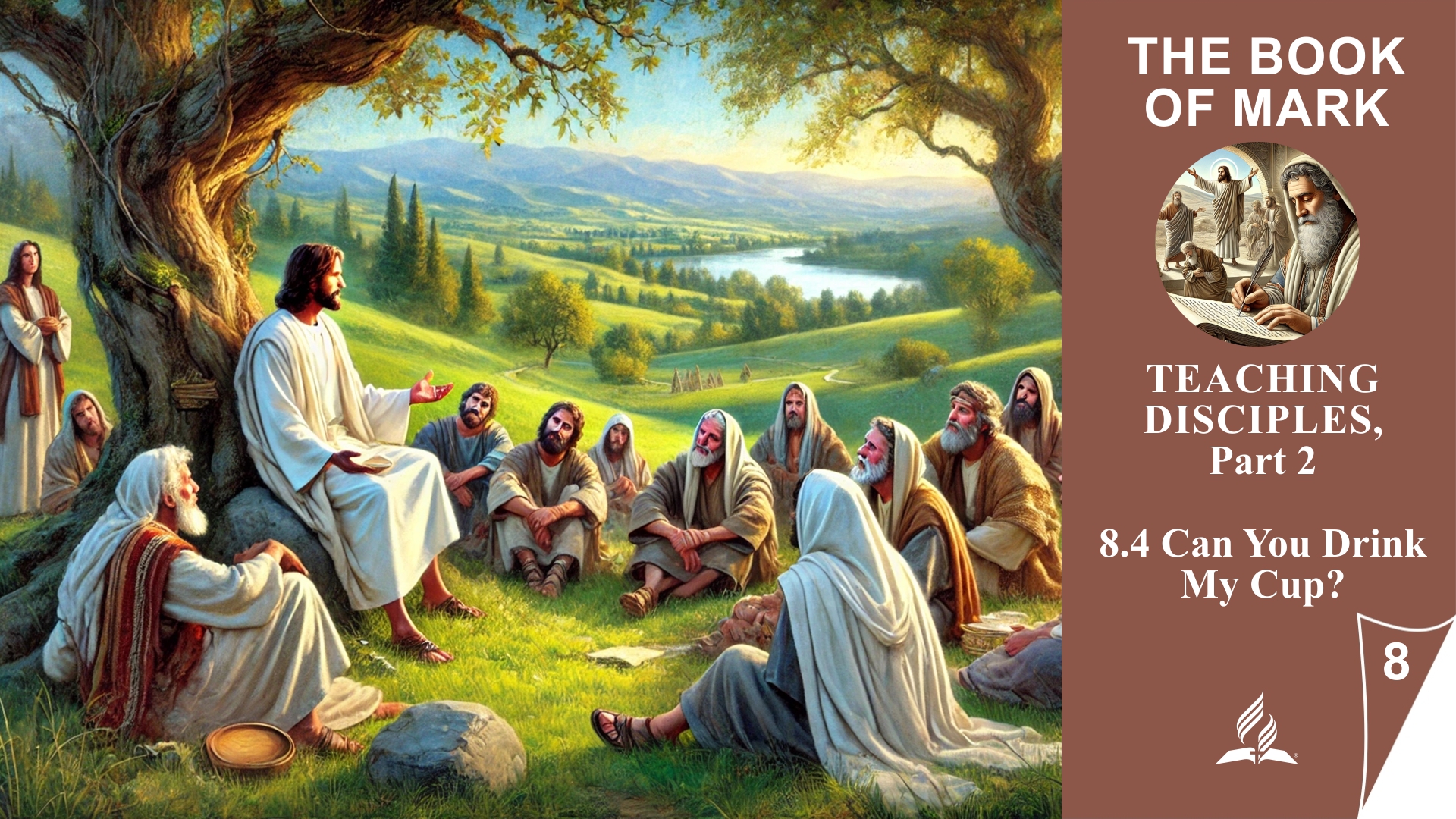


8.4 Can You Drink My Cup?
The True Meaning of Discipleship: Power through Service
Read Mark 10:32–45. In what ways do these verses demonstrate the disciples’ persistent ignorance, not only regarding Jesus’ mission but also about what it means to follow Him?
In Mark 10:32–45, the disciples’ persistent ignorance regarding the true nature of Jesus’ mission and the requirements of discipleship is evident. Jesus openly speaks about His impending suffering, death, and resurrection—events central to His mission. Yet, the disciples seem unable or unwilling to grasp the depth and significance of what Jesus is sharing. Their thoughts are still influenced by ideas of power and glory, as demonstrated by James and John’s request to sit at Jesus’ right and left in His glory.
This request reveals that despite their proximity to Jesus, the disciples are still driven by human ambitions. They seek honor and status without understanding that following Jesus is not about power and fame but about suffering, humility, and service. Jesus uses this opportunity to remind them of the true nature of His Kingdom: in God’s realm, greatness is defined by being a servant, and the highest honor is found in giving one’s life for others.
Jesus challenges James and John to consider whether they are prepared to drink His cup and be baptized with His baptism, meaning to share in the suffering and sacrifices His path entails. Their swift agreement shows that they do not fully comprehend the depth of Jesus’ question. They are unaware that true discipleship involves suffering and sacrifice—something they will only come to understand through their own painful experiences later.
The reaction of the other disciples, who become indignant at James and John’s request, shows that they too have not yet grasped what it means to follow Jesus. They are still caught up in a mindset of competition rather than learning the lesson of humility and service.
Jesus corrects their misconceptions by teaching them a profound lesson: in the Kingdom of God, power is not used for personal gain but to elevate and bless others. Jesus Himself is the ultimate example of this, giving His life as a ransom for many. This teaching is central to understanding Christian discipleship: it is not about seeking earthly honors but about serving others and being willing to walk the path of suffering and sacrifice that Jesus exemplified.
This passage calls us to examine our own ambitions and reframe our understanding of greatness and discipleship in light of Jesus’ example. It reminds us that true greatness lies in serving others and that following Jesus often involves challenges and sacrifices that ultimately lead to true fulfillment and honor.
What does it mean for a Christian to be a “servant” to others? How can you apply this principle in your daily interactions with people?
For a Christian, being a “servant” to others means emulating Jesus’ life and teachings by selflessly serving the well-being of others. This principle is central to Christian discipleship and manifests in various aspects of daily life:
-
Selflessness and Humility:
-
Being a servant means putting others’ needs above our own. In everyday life, this can involve sacrificing personal desires to help others or bring them joy. Simple acts such as spending time with a friend in need or actively supporting those who are struggling are expressions of selflessness.
-
-
Active Assistance and Support:
-
A servant seeks practical ways to help others. This might include assisting a colleague with work without expecting anything in return, supporting a neighbor with everyday tasks, or volunteering in community or charitable projects.
-
-
Compassionate and Respectful Communication:
-
A servant’s heart is evident in how we speak to and treat others. This means listening patiently, showing understanding and compassion, and treating everyone with respect and dignity, especially those who may be overlooked or marginalized.
-
-
Fostering Community and Unity:
-
A servant promotes community and collaboration. This could be through small gestures, such as including people in conversations who might otherwise be excluded, or building bridges between individuals with differing opinions. It’s about being a peacemaker in our surroundings.
-
-
Practicing Forgiveness and Grace:
-
A servant forgives quickly and holds no grudges. This reflects Jesus’ heart, who calls us to forgive others as He has forgiven us. In daily life, this means not being resentful but actively nurturing relationships and prioritizing love over anger.
-
-
Setting an Example:
-
A servant lives in a way that inspires others to serve as well. This involves demonstrating that true happiness and fulfillment come from giving rather than receiving. Our lives should show that serving others is not just a duty but a privilege.
-
-
Prayer and Spiritual Support:
-
A servant prays for others and offers spiritual support when desired. This could mean praying for friends, family, or even strangers, or providing biblical wisdom and encouragement to those in need.
-
Overall, being a servant means actively living out God’s love each day by selflessly meeting the needs of others, seeing and responding to their needs, and always keeping Jesus’ example in mind. This requires awareness, dedication, and a willingness to put others first to serve and visibly manifest God’s Kingdom on earth.
The connection between the lesson “Can You Drink the Cup I Drink?” and our daily lives and faith is profound and practical. Here are some key points that highlight this connection:
-
Understanding Power through Service:
-
Jesus’ teaching that true greatness lies in serving challenges us to reassess our daily interactions and relationships. In everyday life, this means focusing not on gaining power or recognition but on how we can serve others. This might involve using our positions in family, work, or community to help and uplift others rather than seeking personal advantage.
-
-
Accepting Suffering as Part of Discipleship:
-
Jesus made it clear that discipleship often involves suffering and sacrifice, symbolized by the “cup” He drank. For us, this means being prepared to face challenges and sacrifices associated with living faithfully to Christ. This could involve making tough decisions, forgoing personal gains, or remaining steadfast in faith even when it is costly.
-
-
Practicing Humility and Selflessness:
-
The story reminds us that following Jesus requires humility and selflessness. In daily life, this could involve focusing not only on our own needs but also on the needs of others, opening our hearts to those around us, and actively seeking ways to serve them.
-
-
Overcoming a Competitive Spirit:
-
The reaction of the other disciples reveals the tendency towards competition and the desire for status in all of us. Jesus calls us to overcome this mindset and live in cooperation and peace. In practice, this might mean rejoicing in others’ successes and offering support rather than competing, and fostering an environment of encouragement.
-
-
Adopting an Eternal Perspective:
-
Jesus reminds us that true rewards are found not in this life but in the age to come. This perspective helps us remain patient and view our decisions and actions in light of eternity. It encourages us to persevere through difficult times, believing that our service and sacrifices are valued by God and rewarded in the future.
-
Overall, this lesson calls us to integrate the principles of humility, service, and self-sacrifice into our daily lives. It challenges us to live out our discipleship by focusing not on worldly power or recognition but on loving and serving others. This approach leads not only to a deeper relationship with God but also to a life that inspires others and makes God’s Kingdom visible.
The true measure of greatness lies not in power or fame but in how we serve others. Today is an opportunity to live in humility and love by putting the needs of others before our own.
Visited 49 times, 1 visit(s) today








